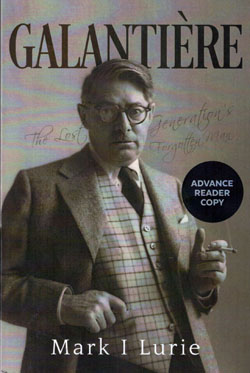Galantière by Mark I. Lurie; Overlook Press © 2017; ISBN 9780999-100202; 402 pages including notes and index.
By Donald H. Harrison

 SAN DIEGO – This was an interesting book to review. Written by the cousin of writer, literary critic, and U.S. government propagandist Lewis Galantière, it is both an expose and a paean.
SAN DIEGO – This was an interesting book to review. Written by the cousin of writer, literary critic, and U.S. government propagandist Lewis Galantière, it is both an expose and a paean.
I found myself disliking Galantière almost immediately when I read how he hid his Jewish heritage; was ashamed of his father; how he invented French ancestors (though the family was from Eastern Europe); and how he fabricated his resume. It also bothered me that Galantière was often dismissive of great talent, and a snob to boot.
And yet, as the well-researched book continued, I found myself developing a grudging respect for Galantière, who was a dogged supporter of the First Amendment right to a free press and a determined foe of government censorship.
Given that author Lurie is the cousin of Galantière, one wonders what Lurie’s motivation might have been. On the one hand, few people today remember Galantière, so if Lurie simply wanted to write a negative appraisal, what was the point? The net effect of the book is to increase awareness of a nearly forgotten literary critic. If on the other hand, Lurie feels that Galantière’s legacy should not be forgotten—regardless of his personal foibles–then he has succeeded admirably in that task.
The book is 402 pages, but only 236 pages are text, with the balance of 166 pages being devoted to extensive notes and an index.
Those of you interested in the lives and development of many American writers who spent the years between World War I and World War II in Paris – Ernest Hemingway, for example – will find Lurie’s account of Galantière’s interactions with them most informative.
There also is a very interesting chapter on Galantière as a member of the Voice of America staff, arguing against those VOA broadcasters who encouraged Hungarian rebels to participate in a bloody and futile revolution against their Soviet overlords in the mid-1950s. He argued correctly that such propaganda spread the false idea that the United States would intervene for the Hungarians—an idea that cost many brave people their lives.
*
Harrison is editor of San Diego Jewish World. He may be contacted via donald.harrison@sdjewishworld.com